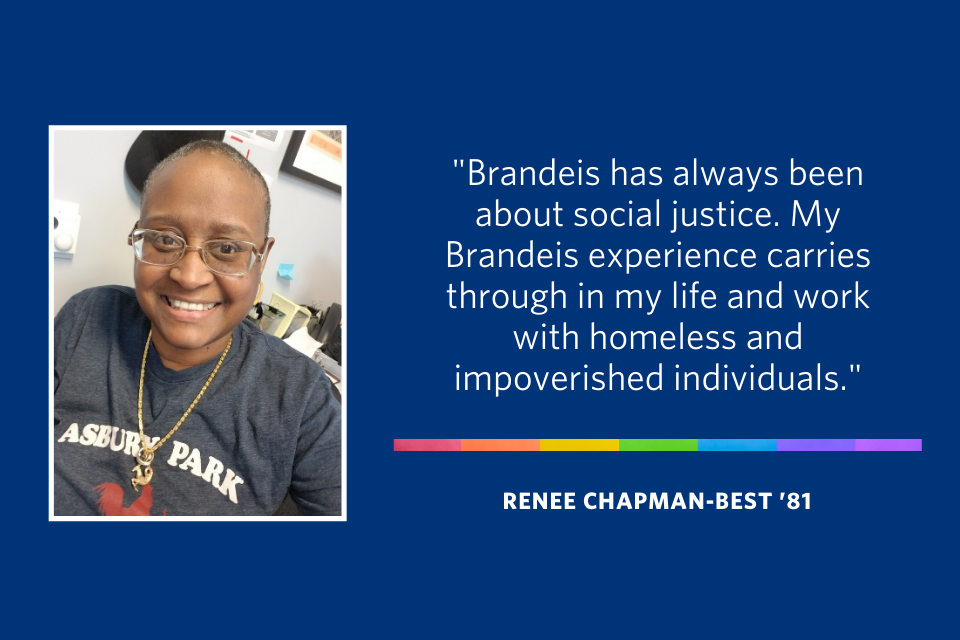Brandeis Alumni, Family and Friends
Renee Chapman-Best ’81 Reflects on Pride Month

Renee Chapman-Best ’81, born and raised in Queens, New York, followed her cousin Abron Touré ’73 and brother Charles Best ’78 to Brandeis, where she studied sociology. After earning her MBA from Clark Atlanta University, she embarked on a corporate career, becoming the first African-American and lesbian director at Mastercard International before making a career shift into social services.
Renee managed employment and education programs for the homeless at Henry Street Settlement’s shelters in New York City, placing more than 1,000 adults and teens into living-wage jobs that allowed them to move into permanent housing. She served on the board of the LGBTQIA+-welcoming Unity Fellowship Church in New York City and volunteered with the New York City Lesbian, Gay, Bisexual & Transgender Community Center, the Audre Lorde Project in Brooklyn, New York, and the Griot Circle in Brooklyn.
Since moving to Los Angeles last year, she has managed a transitional homeless shelter for young people at the Los Angeles LGBT Center. She has been married to Angelle Chapman-Best since 2018.
In honor of Pride Month, the Brandeis Alumni Association invited Renee to reflect on the current protests for racial justice, her experience as an advocate for homeless youth, and whether the concept of “repairing the world” came into her calling.
I absolutely see a connection between past protests against racism and what is going on today. While most things appear to be better, there is still institutional racism we cannot change overnight. More than Mr. Floyd have been killed by police and white supremacists in the past few months. In March it was Breonna Taylor murdered in the safety of her own home. In February it was Ahmaud Arbery killed by white supremacists and swept under the rug by prosecutors for two months before charges were brought. This is no different than what happened during Jim Crow or slavery. The value of an African American life in America is still low.
African Americans have been suffering from generational PTSD for over 400 years. If I look at what my parents had to endure, you're talking about Jim Crow in the South, red-lining in the North, lack of employment opportunities and housing because of their race, poor healthcare options because of their race, inferior education because of their race and so on. If I go back to my grandparents, they had to endure sharecropping abuses in the South and KKK lynchings. That's what I mean about generational PTSD.
The thing that gives me a glimmer of hope for a positive outcome is remembering the protests and riots after Martin Luther King. Jr was assassinated; they lasted for eight days and brought about federal civil-rights legislation. Let's hope today we can chip away at the police infrastructures throughout America with the current protests.
I don’t think I ever set out to “repair the world.” I have felt comfort in volunteer activities over the years and in my eventual transition from corporate finance and marketing to social services. Serving homeless families and underserved people in New York City and now LGBT youth in Los Angeles over the past 20-plus years has allowed me the spiritual and emotional gratification I never found using my MBA in finance.
I oversee a 52-bed homeless shelter for LGBT youth aged 18-24 years old. Our program is an 18-to-24-month housing program that assists youth with independent living skills, educational and employment goals, financial literacy, counseling services, legal services, transitioning and more. The goal of the program is to ensure youth are ready to assume independent living by the end of their stay.
During the current pandemic, holding up is about all we can do. I’m from New York City, so what has been happening specifically at home with loved ones has been devastating. My wife and I are fortunate, however, to both have our jobs and health for us and family.
We have a bit of a challenge here at work. Sheltering in place is difficult for 18-to-24-year-olds to adhere to, especially when you live in a beautiful climate like Los Angeles. We have established many new protocols such as face masks, social distancing, minimizing breaks from the space and temperature checks. My staff members are essential because this is a residence. On top of the challenges the youth are facing, there is also great anxiety among staff.
As far as my world outside of work, my wife and I are usually homebodies. We do have grandchildren, however, that we are aching to hug and kiss!
During Pride Month, there are many milestones to celebrate, especially marriage to my spouse. But in my current position, I am learning more about the struggles of our Trans family. I think the world falls short on accepting our Trans family. Misgendering is a common practice and if we can just progress in that area this year and next, that would be a great start.
Brandeis has always been about social justice. My Brandeis experience carries through in my life and work with homeless and impoverished individuals. Asked what advice or encouragement I would offer a student at Brandeis today, I would say this:
No good deed is too small in changing the world. If you can fill a thimble in your lifetime of good deeds, we can all put our thimbles together to make a huge difference in the lives of others.
Read additional Pride Month reflections from Brandeis alumni.
Published On: June 5, 2020






